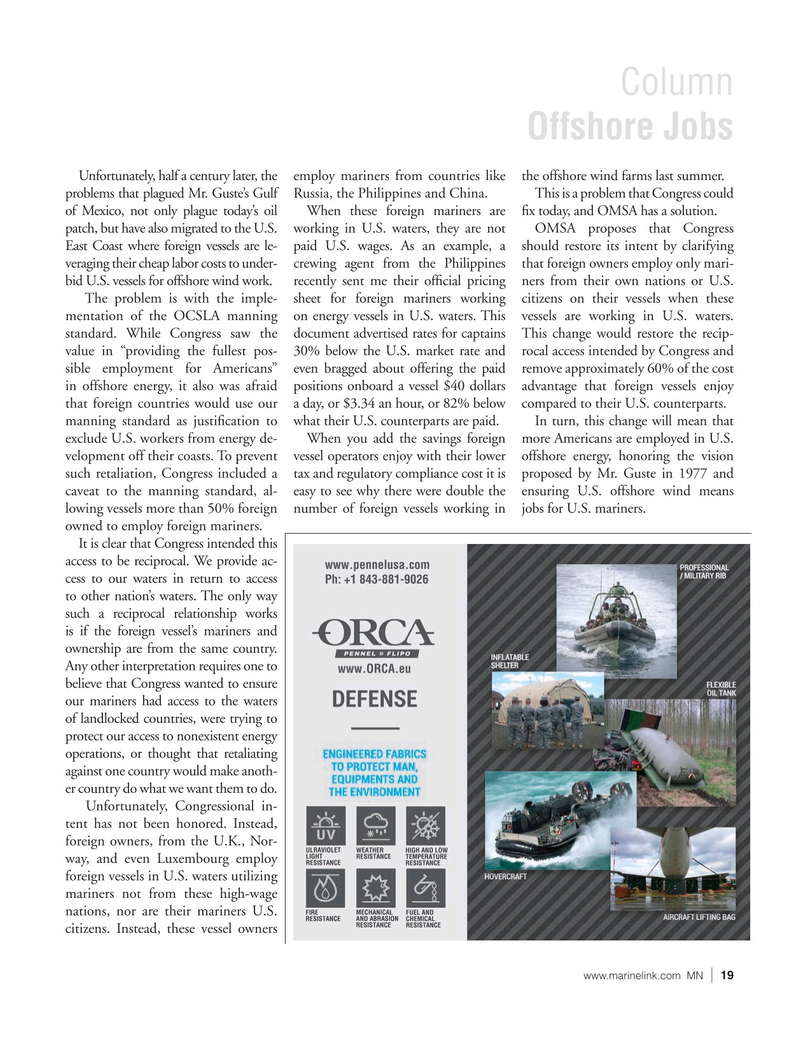
Page 19: of Marine News Magazine (April 2021)
Offshore Energy
Read this page in Pdf, Flash or Html5 edition of April 2021 Marine News Magazine
Column
Offshore Jobs
Unfortunately, half a century later, the employ mariners from countries like the offshore wind farms last summer. problems that plagued Mr. Guste’s Gulf Russia, the Philippines and China. This is a problem that Congress could of Mexico, not only plague today’s oil When these foreign mariners are ? x today, and OMSA has a solution. patch, but have also migrated to the U.S. working in U.S. waters, they are not OMSA proposes that Congress
East Coast where foreign vessels are le- paid U.S. wages. As an example, a should restore its intent by clarifying veraging their cheap labor costs to under- crewing agent from the Philippines that foreign owners employ only mari- bid U.S. vessels for offshore wind work. recently sent me their of? cial pricing ners from their own nations or U.S. The problem is with the imple- sheet for foreign mariners working citizens on their vessels when these mentation of the OCSLA manning on energy vessels in U.S. waters. This vessels are working in U.S. waters. standard. While Congress saw the document advertised rates for captains This change would restore the recip- value in “providing the fullest pos- 30% below the U.S. market rate and rocal access intended by Congress and sible employment for Americans” even bragged about offering the paid remove approximately 60% of the cost in offshore energy, it also was afraid positions onboard a vessel $40 dollars advantage that foreign vessels enjoy that foreign countries would use our a day, or $3.34 an hour, or 82% below compared to their U.S. counterparts. manning standard as justi? cation to what their U.S. counterparts are paid. In turn, this change will mean that exclude U.S. workers from energy de- When you add the savings foreign more Americans are employed in U.S. velopment off their coasts. To prevent vessel operators enjoy with their lower offshore energy, honoring the vision such retaliation, Congress included a tax and regulatory compliance cost it is proposed by Mr. Guste in 1977 and caveat to the manning standard, al- easy to see why there were double the ensuring U.S. offshore wind means lowing vessels more than 50% foreign number of foreign vessels working in jobs for U.S. mariners. owned to employ foreign mariners.
It is clear that Congress intended this access to be reciprocal. We provide ac- cess to our waters in return to access to other nation’s waters. The only way such a reciprocal relationship works is if the foreign vessel’s mariners and ownership are from the same country.
Any other interpretation requires one to believe that Congress wanted to ensure our mariners had access to the waters of landlocked countries, were trying to protect our access to nonexistent energy operations, or thought that retaliating against one country would make anoth- er country do what we want them to do. Unfortunately, Congressional in- tent has not been honored. Instead, foreign owners, from the U.K., Nor- way, and even Luxembourg employ foreign vessels in U.S. waters utilizing mariners not from these high-wage nations, nor are their mariners U.S. citizens. Instead, these vessel owners www.marinelink.com MN 19|

 18
18

 20
20
